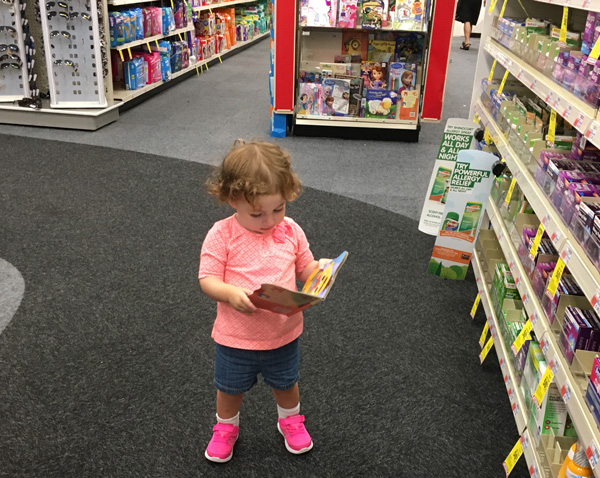Tricky People: The New Way to Talk to Your Kid About Stranger Danger
/Hi everyone!
Can we be serious for a moment? About once a month on a Facebook mom group I'll come across a post along the lines of "OMG I'm freaking out my kid almost got snatched by a man/woman at the store/playground/parking lot!" Followed by a series of comments including "I'm never going to to Target again!" "I'm never leaving the house again!" I'm never putting my 6 year old down again!" Which feels heartfelt in the moment, but... come on... it's Target, people! I can't quit you.
Since we can't avoid all places with strangers, and we don't know when we'll come into contact with these baby snatchers, the best thing we can do is stay near our kids and teach them the difference between good people and bad people. But when you're four years old, your Creep Meter is still pretty weak. The conventional wisdom has been to have them avoid all strangers, but when they wander off to look at a toy and suddenly Mom is nowhere to be found, what are they supposed to do when they need help and EVERYONE is a stranger?
This scenario is why Pattie Fitzgerald, the founder of the sexual abuse education company Safely Ever After, popularized the (brilliant!) concept of Tricky People. Instead of telling your kids that every stranger is bad news, we teach them to make educated inferences about the intentions of people based on their professions and their behavior. Even the littlest toddler can get on board with this. You start by teaching them the habits of Tricky People, then give them tools so they can discern potentially safe people to seek out if they need help and Mommy and Daddy aren't there.
What Kids Should Know About Tricky People
The problem with "Stranger Danger" is that it teaches kids that strangers are scary, but the type of strangers who look to entice kids don't act scary. They are typically friendly and charming. The difference between Tricky People and and safe strangers is that safe people will ask other adults for help, while Tricky People ask kids for help to do something that an adult should do. Tricky People will try to entice your child to break safety rules, like going somewhere without Mom or Dad or giving away personal information to someone they don't know.
So, the most important thing to teach little kids is that adults don't ask kids for help. For example, if an adult loses their pet, they ask other adults for help, not kids, because adults can use the phone or talk to police or get in their cars or make signs.
And no adult will tell a kid to keep something a secret from Mom or Dad. And this includes telling a kid not to ask a parent for permission. Kids should know they can't go anywhere or with anyone without asking Mom or Dad first.
Don't send your kid out in public with their name on their shirt, backpack, or anywhere else it can be seen and used to call them.
So what happens when your kid gets lost somewhere? Fitzgerald recommends they freeze and yell, or find a mom with kids to ask for help. She identifies a mom with kids as the safest stranger (odds are that mom's not yearning for more!). You can also talk to your child about identifying police officers, dads with kids, and store managers.
What Parents Should Know About Tricky People
When it comes to kidnapping, the above tips are great to keep kids alert and aware. But the sad truth is that your kids are less likely to be kidnapped by a stranger than they are to suffer abuse at the hands of someone they know, like a relative or a coach. The tenets of Tricky People will only get them so far when they are frequently alone with someone your family trusts, like a music teacher. It's up to us parents to be alert to potentially unsafe situations that can arise with the people in our circle. Here's how:
Be alert to gifts or unusual attention from people in your kid's life. If your kid seems to be an instructor's favorite or receives gifts from an adult for seemingly no reason, it could be a sign they are being groomed for abuse.
People who want to spend alone time with your kid or babysit for free who aren't Grandma and Grandpa should be met with a raised eyebrow. How many other people's kids do you watch for free?
Remember, kids are intuitive. If they don't want to be around a babysitter or relative, pay attention. They may be getting a red flag you aren't aware of. Also, be careful when older kids are playing with younger kids. Keep doors open and an ear out.
Fitzgerald recommends to keep the conversation positive. Instead of telling kids there are people out there who want to harm them, tell them that anyone who tries to get them to break a family safety rule is a Tricky Person, and they should find someone else to go to right away. Have them memorize family rules and go over a few scenarios so they can practice judging the difference.
I hope this helps! Back to School is a great time to talk to kids about Tricky People, as they'll be building new friendships and relationships with teachers. Let's keep our kids safe (and keep Target off our blacklist!)
That's it for this week! As always, check our website for events. And if you like what you're reading, help keep the computer screen on by following us on Facebook or Instagram and signing up for our weekly emails at BabyGotChat.com.
See you next time!
Andrea



